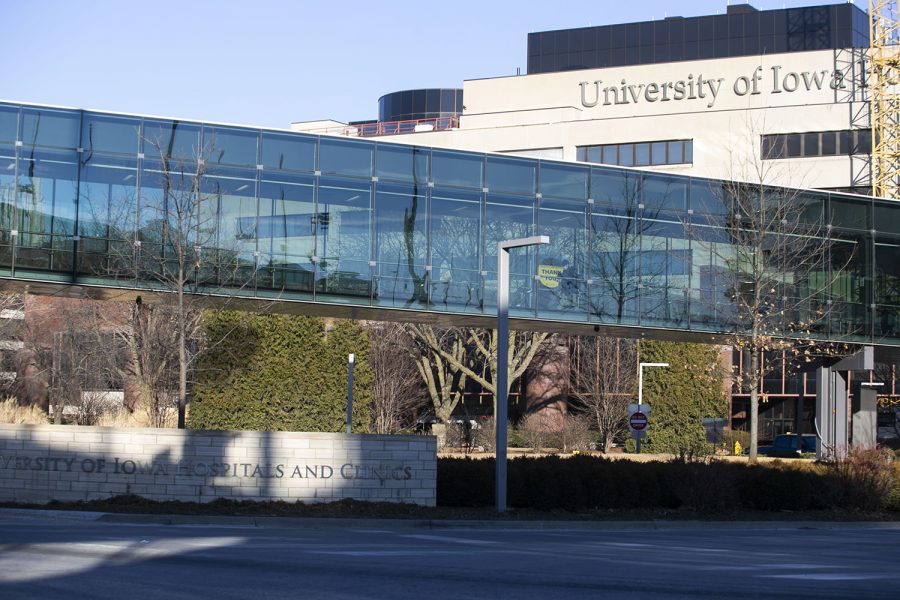UIHC expects to continue exceeding budget after staffing compensations, reassignments
The hospital complex expects to continue exceeding its budget because of staffing reassignments and compensations to accommodate for the effects of COVID-19, despite relative financial stability compared to other institutions.
University of Iowa Hospitals and Clinics is seen on Tuesday, Feb. 15, 2022.
February 23, 2022
University of Iowa Hospitals and Clinics will continue to operate over budget because of a sharp increase in staff compensation, CEO Suresh Gunasekaran told the state Board of Regents Wednesday.
“It’s unavoidable for us not to continue to experience labor challenges that everyone in the health care industry is doing,” Gunasekaran said.
Throughout January and February, hundreds of staff members left work because of COVID-19’s effects on family or staff members themselves, he said. As a result, UIHC has continued to offer staff compensation for extra shifts, critical jobs, and the influx of travel nurses from outside the state.
“When you don’t have enough staff you can’t do all of the care that you want to deliver,” he said. “And at the same time, our labor rates are far more than we budgeted for.”
UIHC plans to return to normal operations at the end of this month because of the staffing reassignments made at the beginning of the year, Gunasekaran said.
UIHC’s current operating margin is about $82 million, or 7 percent, which is about $34 million above its budget, said Mark Henrichs, associate vice president and chief financial officer at UI Health Care.
Compared to its peer groups, Henrichs said UIHC’s margins have remained positive throughout the pandemic.
COVID-19 protocol
UI Vice President for Medical Affairs Brooks Jackson said while national and state COVID-19 infection and hospitalization rates are plummeting, UIHC has begun to reverse staff reassignments that the omicron variant necessitated.
“I am also consciously optimistic that we have finally turned the corner on the pandemic,” he said.
Around 90 percent of UIHC’s staff have already complied with the federal Centers for Medicare and Medicaid Services vaccination requirements a month before the deadline, Jackson said.
He also said the Centers for Disease Control and Prevention is expected to loosen its mask guidance this week or next week. Jackson expects that UIHC will be in a better place regarding COVID-19 a month from now.
“That’s not only good news from the perspective of the pandemic becoming less of an emergency and more a manageable risk, but also because there is tremendous pent-up demand for our services that we are eager to accommodate for our Iowans,” he said.
Despite the increase in costs, Jackson said UIHC has been doing well financially. Becker’s healthcare rated the hospitals and clinics at No. 10 on its top 10 list of health systems with strong finances. This puts UIHC in a strong position to further infrastructural, research, and educational investment needs, he said.
“Our overall external funding has really grown over the last five years from NIH [National Institutes of Health] funding, with about $101 million to $147 million — that’s a very large increase — and has been steadily improving month to month lately and applications are up,” he said.
Henrichs said the challenge of this year is maintaining volume of staff within a tight labor market.
UIHC’s vacancy rate has doubled since last year, he added.
The hospitals and clinics were able to maintain volumes throughout the first half of 2021 because of large-scale management interventions, but continue to face labor and non-labor inflation, said Henrichs.
“The length of stay has gone up year over year,” Henrichs said. “We’re still running on a very high occupancy level overall.”
Vacancy has affected the surgery space, he said, where rates are flat year to year because of staffing and bed challenges.
“As we’re doing initiatives to recruit new staff, maintain staff in some of the higher agency levels, we’ll see the rest of the year we’ll probably be over budget each month for the overall salary expense,” he said.



